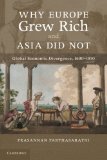Why Europe Grew Rich and Asia Did Not: Global Economic Divergence, 1600-1850
[Cross-posted from New Books in History] It’s a classic historical question: Why the West and not the Rest? Answers abound. So is there anything new to say about it?

According to Prasannan Parthasarathi, there certainly is. He doesn’t go so far as to say that other proposed explanations are flat out wrong, it’s just that they don’t really focus on the narrow forces that, well, forced English business men to innovate in the 18th century. In Why Europe Grew Rich and Asia Did Not: Global Economic Divergence, 1600-1850 (Cambridge University Press, 2012), Parthasarathi says that those forces were economic. English textile merchants were getting trounced by imported Indian cotton. They found that they couldn’t produce cotton goods in the same way the Indians did for all kinds of reasons. So, they had to create a new, more efficient, production process. They did. According to Parthasarath, the “Industrial Revolution” was born out of economic competition and innovation (with, of course, a helping hand from the state). That makes a lot of sense.
